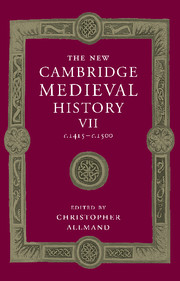Book contents
- Frontmatter
- PART I GOVERNMENT
- PART II ECONOMIC AND SOCIAL DEVELOPMENTS
- PART III SPIRITUAL, CULTURAL AND ARTISTIC LIFE
- PART IV THE DEVELOPMENT OF EUROPEAN STATES
- 17 Germany and the Empire
- 18 Hus, the Hussites and Bohemia
- 19 France
- 20 Burgundy
- 21 England
- 22 The Celtic world
- 23 Italy
- 24 The Iberian peninsula
- 25 The Swiss Confederation
- 26 The States of Scandinavia, c. 1390– c. 1536
- 27 Hungary: Crown and Estates
- 28 The Kingdom of Poland and the Grand Duchy of Lithuania, 1370–1506
- 29 Russia
- 30 Byzantium: The Roman Orthodox World, 1393–1492
- 31 The Latin East
- 32 The Ottoman World
- 33 Conclusion
- Appendix Genealogical Tables
- Primary Sources and Secondary Works Arranged by Chapter
- Index
- Frontispiece
- Plate section
- Map 1 European towns in the late Middle Ages
- Map 2 European commerce and trade
- Map 4 Winds and currents facilitating the discoveries
- Map 5 The universities o f Europe in 1400 and 1500
- Map 6 Germany and the Empire
- Map 20 The Roman Orthodox and Ottoman worlds in the fifteenth century
- References
33 - Conclusion
from PART IV - THE DEVELOPMENT OF EUROPEAN STATES
Published online by Cambridge University Press: 28 March 2008
- Frontmatter
- PART I GOVERNMENT
- PART II ECONOMIC AND SOCIAL DEVELOPMENTS
- PART III SPIRITUAL, CULTURAL AND ARTISTIC LIFE
- PART IV THE DEVELOPMENT OF EUROPEAN STATES
- 17 Germany and the Empire
- 18 Hus, the Hussites and Bohemia
- 19 France
- 20 Burgundy
- 21 England
- 22 The Celtic world
- 23 Italy
- 24 The Iberian peninsula
- 25 The Swiss Confederation
- 26 The States of Scandinavia, c. 1390– c. 1536
- 27 Hungary: Crown and Estates
- 28 The Kingdom of Poland and the Grand Duchy of Lithuania, 1370–1506
- 29 Russia
- 30 Byzantium: The Roman Orthodox World, 1393–1492
- 31 The Latin East
- 32 The Ottoman World
- 33 Conclusion
- Appendix Genealogical Tables
- Primary Sources and Secondary Works Arranged by Chapter
- Index
- Frontispiece
- Plate section
- Map 1 European towns in the late Middle Ages
- Map 2 European commerce and trade
- Map 4 Winds and currents facilitating the discoveries
- Map 5 The universities o f Europe in 1400 and 1500
- Map 6 Germany and the Empire
- Map 20 The Roman Orthodox and Ottoman worlds in the fifteenth century
- References
Summary
‘europe is only as wide as a short summer night.’ Thus Heinrich Böll could describe her breadth, from Russia in the east to the Atlantic seaboard in the west, in terms of a brief period of darkness. In contrast to the whole breadth and depth of the globe, small she might be. But her history was far from uniform. The attentive reader will have remarked that, for all the similarities between the histories of Europe’s numerous countries and the generalisations made by contributors to the first parts of this volume, the many differences noted have shown a continent of great variety.
As a major part of its inheritance, fifteenth-century Europe had accepted a considerable diversity of political systems. Furthermore, there had long existed an eagerness, now given greater actuality by the need to resolve the fundamental problem regarding authority created by the Great Schism, to discuss the nature and sources of authority, and how best it should be translated into legitimate and effective power. The system of rule by one, monarchy or principality, dominated much of Europe, particularly in its western parts. Yet other systems existed. One was that by which the Swiss Confederation was ruled, while another controlled the affairs of Venice. In Bohemia, there was a strong movement towards a wider form of popular participation in decision making in matters concerning society, something from which the Church, ruled by the pope (himself a kind of monarch), was not immune. Representation worked in some countries (England) but not in others (France). Some favoured it both out of principle and because it was thought to lead to more effective rule. One who taught this was Sir John Fortescue, whose criticisms of the French king’s dominium regale was based on the fact that the consent implied in his English counterpart’s dominium politicum et regale was conducive to a better relationship between ruler and ruled. The historian, it is clear, should not think of representative assemblies as being of only a single kind.
Keywords
- Type
- Chapter
- Information
- The New Cambridge Medieval History , pp. 831 - 840Publisher: Cambridge University PressPrint publication year: 1998

